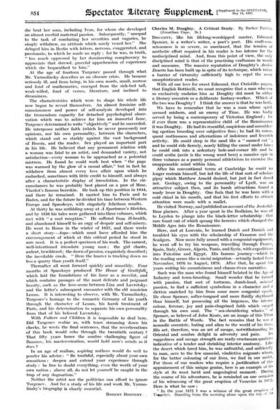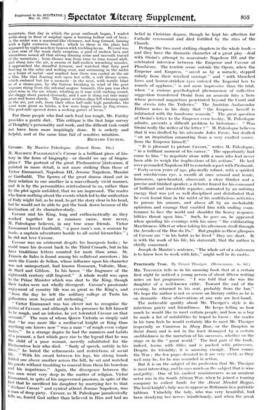Charles M. Doughty. A Critical Study. By Barker Fairley. (Jonathan
Cape. 9s.)
DOUGHTY, like his lifelong-worshipped master, Edmund Spenser„ is a writer's writer, a poet's poet. His Craft-con- sciousness is so severe, so unrelaxed, that the tension of aesthetic effort required in his reader is too intense for the undisciplined mind. And, from this point of view, the only disciplined mind is that of the practising craftsman in words and measures. The massive reputation of Doughty's Arabia Deserta has been built up in spite of its technique, which raises a barrier of virtuosity sufficiently high to repel the more unsophisticated reader.
With all our love for sweet Edmund, that Christlike pagan, that English Botticelli, we must recognize that a man who can so exclusively enshrine him as Doughty (lid must be either a literary eccentric or a deliberate fantasy-worker. Which of the two was Doughty ? I think the answer is that he was both.
We have to remember that he was a man whose spirit seemed misborn, and an enemy of Time. He was badly served by being a contemporary of Victorian England ; for if ever there was a representative child of the Renaissance it was Doughty. He had its resentful, suspicious and smoulder- ing egotism brooding over subjective fires ; he had its conse. quent restlessness and alternations of indolence and feverish activity. He could sleep in the sand like a " sunned cat " ; and he could ride fiercely, nearly killing the camel under him ; he could sink into a sedentary hole-and-corner life and he could scribe (write is the wrong word here) a massive epic in three volumes as a purely personal athleticism to exercise the unappeasable mind within him.
After his conventional terms at Cambridge he could no longer restrain himself, but led the life of that sort of scholar- gipsy which Matthew Arnold desired, but just in fact dared not. Geology, owing to the personality of Lyell, was an attractive subject then, and its harsh attractions found a ready lover in Doughty. One feels that he was born with a cold chisel in his mouth, and that his first efforts to attract attention were made with a mallet.
He visited Norway, and published an account of the Jostedal- Brae glaciers. After a year spent in the Bodleian, he was off to Leyden to plunge into the black-letter scholarship—that rare fount out of which sprang the heresies which changed the Middle Ages into the Renaissance.
Here, and at Louvain, he learned Dutch and Danish and troubled his eyes with the scholarship of Erasmus and the Scaligers. Now more fully armed with a congenial equipment, he went off to try his weapons, travelling through France, Spain, Italy, Greece, Algeria, Tunis, and Syria, with expeditions into Palestine and Egypt. His famous journey—which in the reading seems like a racial migration—actually lasted from November, 1876 to August, 1878. After that, he spent ten years writing his mountainous and chasm-riven narrative.
Such was the man who found himself belated in the Age of Industry and town-breeding. Small wonder that he turned with passion, that sort of tortuous, dumb-loud, mineral passion, to find a sufficient symbolism in a character and a diction snatched by him from some more congenial epoch. He chose Spenser, softer-tongued and more fluidly rhythmed than himself, but possessing all the largeness, the intense colour, fervour, joy and pain-chagrined faith which surged through his own soul. The " sea-shouldering whales " of Spenser, so beloved of John Keats, are an image of this Titan in the Battle of Words. The fact remains that he was a nomadic eccentric, hating and alien to the world of his time. His art, therefore, was an -art of escape, notwithstanding its
Oriental and sombre delight in adversity and pain. Its ruggedness and savage strength are really crustacean qualities indicative of a tender and shrinking interior anatomy. Like the desert which lured him, he was unfruitful, and unfriendly to man, save to the few unsocial, vindictive migrants whom, for the better colouring of our lives, we find in our midst. For those of our readers who require a justification of this appraisement of this unique genius, here is an example of his style at its most lucid and ungeological moment. During the course of his adventures, he is reminded on one occasion of his witnessing of the great eruption of Vesuvius in 1872. Here is what he saw :
" In the year 1872 I was a witness of the great eruption of Wiativiu4. Standing from the morning alone upon the top of the mountain, that day in which the great outbreak began, I waded ankle-deep in flour of sulphur upon a burning hollow soil of lava : in the midst was a mammal-like chimney, not long formed, fuming with a light corrosive breath ; which to those in the plain had appeared by night as a fiery beacon with trickling lavas. Beyond was a new seat of the weak daily eruption, a pool of molten lava and wherefrom issued all that strong dinning noise and uncouth travail of the mountain ; from thence was from time to time tossed aloft, and slung into the air, a swarm of half-molten wreathing missiles. I approached the dreadful ferment, and watched that fiery pool heaving in the sides and welling over, and swimming in the midst as a fount of metal—and marked how there was cooled at the air a film, like that floating web upon hot milk, a soft drossy scum, which endured but for a moment—in the next, with terrific blast as of a steam-gun, by the furious breaking in wind of the pent vapours rising from the infernal magma beneath, this pan was shot sheet-wise in the air, where, whirling as it rose with rushing sound, the slaggy sheet parted diversely, and I saw it slung out into many great and lesser shreds. The pumy writhen slags fell whissing again in the air, yet soft, from their often half-mile high parabolas, the most were great as bricks, a few were huge crusts as flag-stones. The pool-side spewed down a reeking gutter of lavas."
For those people who find such food too tough, Mr. Fairley provides a gentle diet. This critique is the first large survey of DoUghty's personality and work, and the difficult task could not have been more inspiringly done. It is orderly and helpful, and at the same time full of sensitive intuition.
RICIIARD CIIURCII.



























































 Previous page
Previous page